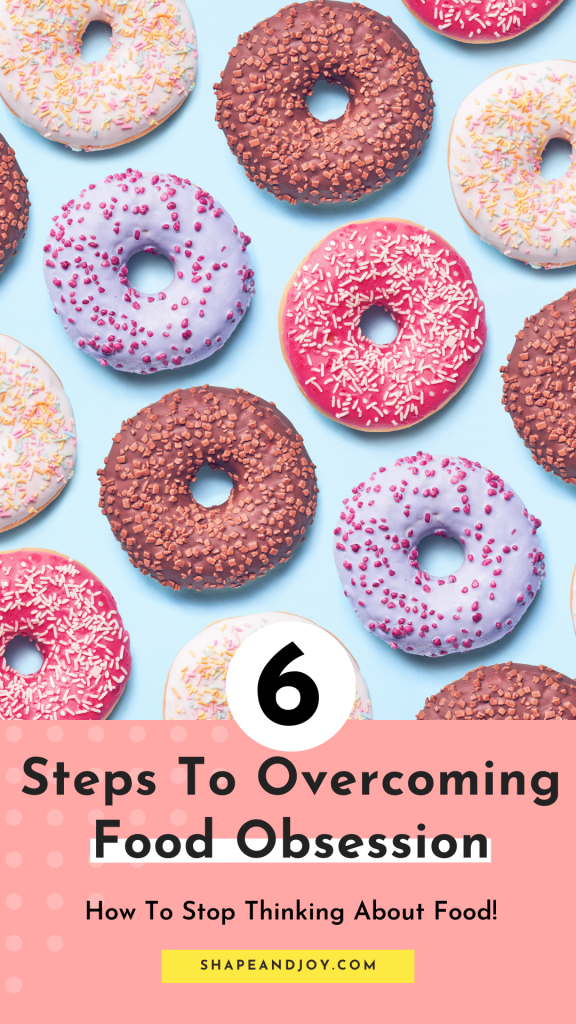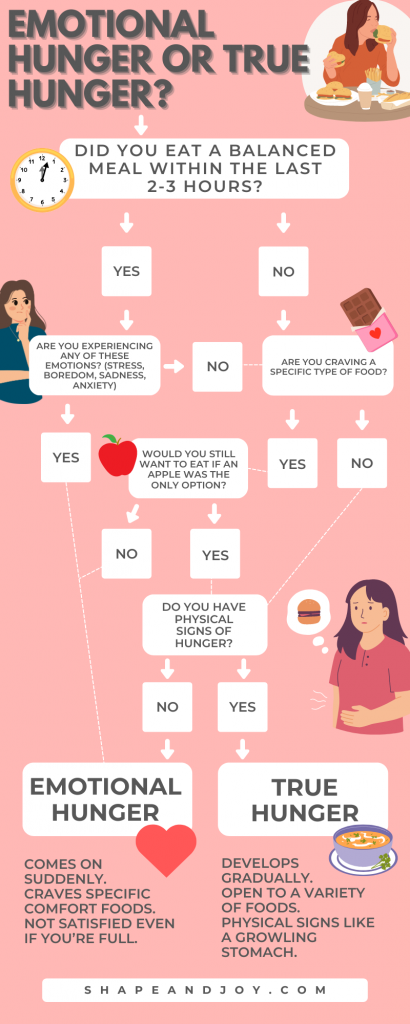This post may contain affiliate links, which means that I may earn a commission if you click on the link, with no cost for you. It’s one of the ways I support my blog. You can read more about this here.
Do you ever feel like food is running your life? You know, those days when you can’t stop thinking about your next meal, and somehow you’ve planned dinner before breakfast is even over?
Or maybe you’re caught in that guilt cycle – eat something you ‘shouldn’t,’ then spend the rest of the day obsessing over it. Been there, done that. It’s exhausting, isn’t it?
Here’s the thing: constantly thinking about food, feeling guilty, or turning to snacks when life gets a bit too much isn’t just about hunger.
It’s a sign that something deeper might be going on, and I get it.
I used to live in this all-or-nothing mindset, obsessing over every bite, only to fall into a binge-restrict cycle that took over my life.
But what if I told you that breaking free from food obsession is possible? It’s not just about what you eat but understanding why you’re thinking about food 24/7.
In this post, we’ll dive into how to stop obsessing over food, and I’ll share what helped me break the cycle and finally make peace with eating.
So, in this post, I’ll discuss:
- Understanding food obsession and why it happens
- How to recognise your triggers and stop emotional eating
- Developing mindful eating habits to slow down and savour food
- Finding healthy distractions to break the focus on food
- Creating a balanced eating plan to stop overthinking your meals
- When to seek professional help and build a support system
Ready to start? Let’s go!
SEE MY COMPLETE GUIDE ON HABIT FORMATION > Mastering Habit Formation and Behaviour Change For Your Health

Understanding Food Obsession
Let’s be real.
Food obsession isn’t just about loving food. It’s that constant buzzing in the back of your mind – planning meals, feeling guilty about what you’ve eaten, or using food as a crutch when emotions get overwhelming.
I know this game well. I used to live in the “all or nothing” world – either I was 100% on track or completely off the rails, and trust me, either way, my brain was consumed with food.
The guilt, the overthinking, and the endless cycle – sound familiar?
Why Do People Become Obsessed with Food?
There are so many reasons why we might fixate on food:
Stress and anxiety: That lovely comfort of a snack when life’s too much.
Emotional distress: We’ve all used food to cope with our feelings (hello, how to stop emotional eating).
Boredom: Nothing to do? Oh, let’s just eat.
Societal pressure: Media telling us how we should look – no wonder we’re obsessed!
Dieting: Restrict yourself too much and your brain goes into survival mode – food becomes the only thing you can think about.
Nutritional deficiencies: Sometimes, your body’s just crying out for what it’s not getting.

How Food Obsession Affects Physical and Mental Health
This kind of obsession isn’t doing anyone any favours.
Physically, it can lead to unhealthy eating patterns, weight swings, and nutrient deficiencies. Mentally? It’s draining.
It causes anxiety, depression, and makes you miss out on all the joyful moments of life because you’re too busy worrying about your next snack.
Trust me, recognising this cycle is the first step to breaking free.
Constantly switching between dieting and counting calories can lead to frustration. Learn about the downsides of calorie counting in The Downside of Calorie Counting.
POSTS YOU MAY BE INTERESTED IN:
- Examples Of Extrinsic And Intrinsic Motivation: What Drives You?
- Unconditional Permission To Eat For Sustainable Weight Loss
- Yo-Yo Dieting – How To Stop: A Guide To Sustainable Weight Loss
Step 1: Identify the Triggers
The first key to figuring out how to stop obsessing over food is pinpointing your triggers.
For me, it was stress and boredom.
I’d grab snacks when I felt overwhelmed or just had nothing else to do. And the guilt? That would just push me to restrict food even more, only to end up binging later.
It’s a vicious cycle, but here’s the good news: once you know your triggers, you can start to break free from them.
How to Recognise Your Own Triggers
Think about it. When do you find yourself obsessing over food the most? After a stressful day at work? On a lonely weekend?
Once you pinpoint those moments, you can begin to understand why you turn to food.

Step 2: Develop Mindful Eating Habits
What is Mindful Eating?
If you’ve never tried mindful eating, now’s the time.
It’s all about slowing down, being present, and actually enjoying your food. When you take the time to savour each bite, you not only enjoy your meals more, but you’re also more likely to notice when you’re full.
This was a game changer for me and helped me stop those food cravings dead in their tracks.
Techniques for Mindful Eating
- Slow down: Seriously, eat like you’ve got all the time in the world.
- Savour it: Notice every flavour, texture, and smell.
- Eliminate distractions: No TV, no phone – just you and your plate.
Benefits of Mindful Eating
Not only does this approach improve digestion, but it also helps you feel satisfied, reducing the urge to snack mindlessly.
And the best part?
It helps stop overeating by making eating a purposeful and pleasurable experience rather than a mindless habit.
Reverse dieting can be a great way to stabilise your progress after a long period of dieting. Check out my full guide in Reverse Dieting 101.

Step 3: Find Healthy Distractions
We’re all guilty of reaching for food when we’re bored or stressed. But let me tell you, there are much better ways to keep your mind occupied.
For me, it’s all about cosy activities – crocheting, adult colouring books, or going for a brisk walk.
These hobbies don’t just distract you; they engage your mind and keep those pesky food cravings at bay.
Physical Activities and Hobbies
- Get moving: A quick workout or even a stroll works wonders.
- Hobbies: Crocheting, gaming, or even reading a book can keep your brain busy.
Mental Engagement
- Read, learn, create: Challenge your brain with something that keeps your hands and mind occupied – it’s a great way to avoid mindless snacking and beat hedonic eating.
Social Connections: Spending Time with Friends and Family
- Spend time with loved ones. Socialising can be a great distraction from food obsession. Plan outings, have game nights, or simply enjoy a conversation.
POSTS YOU MAY BE INTERESTED IN:
- Enjoy Movement: How To Find Fun In Every Workout
- 5 Types Of Mentality: A New Approach To Healthy Habit Changes
- Workout Burnout: How To Find Joy And Balance

Step 4: Create a Balanced Eating Plan
This one’s key, folks.
You need to make sure you’re eating enough – and eating well. When you don’t give your body what it needs, it’s no wonder you end up obsessing over food.
Eating balanced, satisfying meals helps stabilise hunger, gives you energy, and keeps those cravings in check.
Plus, I’ve found that when I don’t restrict myself, I’m far less likely to suffer from food guilt or binge later on.
Make Sure You’re Eating Enough
Skipping meals or not eating enough can lead to increased food obsession and cravings.
Make sure your meals are satisfying and provide the energy you need throughout the day.
Eating balanced, regular meals helps stabilise your hunger and reduces the urge to overeat later.
Step 5: Seek Professional Help
Sometimes, overcoming food obsession requires professional help.
If you find that food thoughts dominate your daily life, or if you’re struggling with disordered eating habits, it’s time to seek assistance.
Therefore, don’t hesitate to reach out if you feel overwhelmed, anxious, or depressed about your relationship with food.

Step 6: Practice Self-Compassion and Patience
Change doesn’t happen overnight. It’s important to be kind to yourself throughout this journey.
Setbacks are a natural part of the process.
However, self-compassion helps you stay motivated and reduces feelings of guilt or frustration.
Remember, every step forward, no matter how small, is progress.
Positive Affirmations, Self-Care Routines
Practicing self-compassion involves being gentle with yourself.
For example, start with positive affirmations. Remind yourself daily that you are worthy and capable of change.
Establish mindful eating routines that make you feel good, like reading, doing one of your hobbies, or spending time outdoors.
It’s important to focus on body fat loss, not just the number on the scale. Learn how to measure your progress effectively in Weight Loss vs. Body Fat Loss.

How to Stop Thinking About Food: Conclusion
Breaking the cycle of food obsession is challenging, but it’s definitely achievable.
Remember, every small step you take brings you closer to a healthier, more balanced life.
Persistence is key, and support is always available, whether from professionals, loved ones, or communities facing similar struggles.
You have the strength to make this change.
Don’t wait to start your journey and learn how to stop thinking about food today by identifying one trigger or trying a mindful eating exercise.
Every action counts and brings you closer to breaking free from food obsession.
Embrace this journey with confidence and self-love, and take that first step toward a healthier, happier you.
How to Stop Thinking About Food: Additional Resources
Books and Articles
- “Mindful Eating: A Guide to Rediscovering a Healthy and Joyful Relationship with Food” by Jan Chozen Bays: This book offers practical advice on how to practice mindful eating.
- “The Food Therapist: Break Bad Habits, Eat with Intention, and Indulge Without Worry” by Shira Lenchewski: A great read for understanding and overcoming emotional eating.
Apps and Tools
- Calm: An app that offers guided meditations, courses and mindfulness.
- Recovery Record: An app designed for people dealing with eating disorders, providing support and tracking progress.
Support Groups and Hotlines
- Beat – The UK’s leading eating disorder charity offers support groups and resources for those struggling with eating disorders. Website: beat – Phone: 0808 801 0677
- Overeaters Anonymous Great Britain – A fellowship of individuals who share their experiences and support each other in overcoming compulsive eating. Website: oagb
- Mind – Provides support groups and local services for various mental health issues, including food-related concerns. Website: mind – Phone: 0300 123 3393.
- Samaritans – Provides confidential support for people experiencing feelings of distress or despair. Phone: 116 123. Website: samaritans


